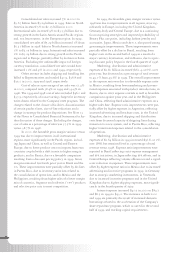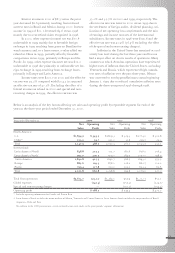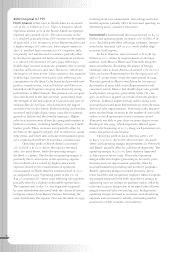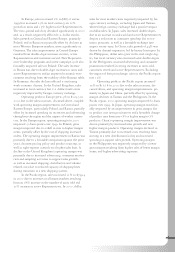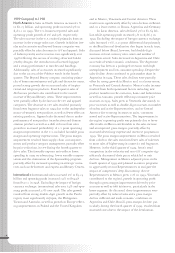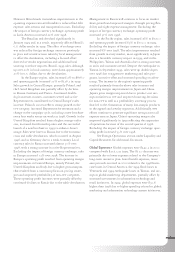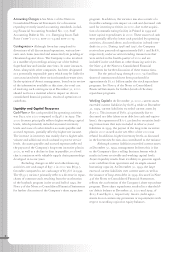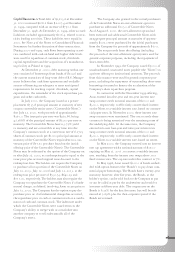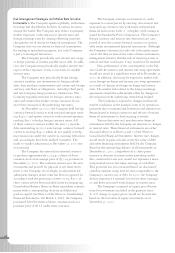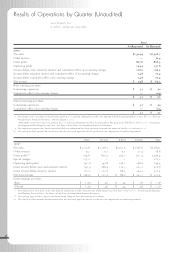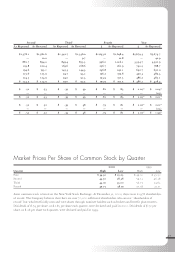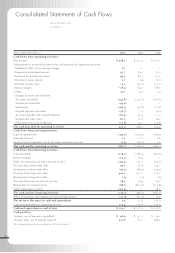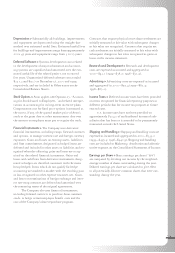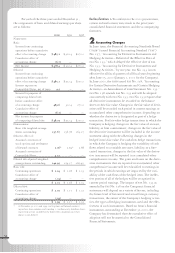Avon 2000 Annual Report Download - page 14
Download and view the complete annual report
Please find page 14 of the 2000 Avon annual report below. You can navigate through the pages in the report by either clicking on the pages listed below, or by using the keyword search tool below to find specific information within the annual report.
Risk Management Strategies and Market Rate Sensitive
Instruments > The Company operates globally, with manu-
facturing and distribution facilities in various locations
around the world. The Company may reduce its primary
market exposures to fluctuations in interest rates and
foreign exchange rates by creating offsetting positions
through the use of derivative financial instruments. The
Company does not use derivative financial instruments
for trading or speculative purposes, nor is the Company
a party to leveraged derivatives.
The Company periodically uses interest rate swaps
to hedge portions of interest payable on its debt. In addi-
tion, the Company may periodically employ interest rate
caps to reduce exposure, if any, to increases in variable
interest rates.
The Company may periodically hedge foreign
currency royalties, net investments in foreign subsidi-
aries, firm purchase commitments and contractual foreign
currency cash flows or obligations, including third party
and intercompany foreign currency transactions. The
Company regularly monitors its foreign currency expo-
sures and ensures that hedge contract amounts do not
exceed the amounts of the underlying exposures.
At December 31, 2000, the Company held foreign
currency forward contracts with notional amounts total-
ing $393.7 and option contracts with notional amounts
totaling $19.1 to hedge foreign currency items. All
of these contracts mature within the next 13 months.
Also outstanding in 2000 were foreign currency forward
contracts totaling $34.2, which do not qualify as hedg-
ing transactions under the current accounting definitions
and, accordingly, have been marked to market. The
mark-to-market adjustment at December 31, 2000 was
not material.
The Company has entered into forward contracts
to purchase approximately 1,374,400 shares of Avon
common stock at an average price of $37.09 per share at
December 31, 2000. The contracts mature over the next
ten months and provide for physical or net share settle-
ment to the Company. Accordingly, no adjustment for
subsequent changes in fair value has been recognized. In
accordance with the provisions of eitf 00-19, $51.0 of
these contracts have been included in the accompanying
Consolidated Balance Sheets in Share repurchase commit-
ments with a corresponding decrease in Additional
paid-in capital. See Note 2of the Notes to Consolidated
Financial Statements. On March 1, 2001, the Company
purchased 260,000 shares of Avon common stock at a
purchase price of $11.5 under these contracts.
The Company attempts to minimize its credit
exposure to counterparties by entering into interest rate
swap and cap contracts only with major international
financial institutions with “a” or higher credit ratings as
issued by Standard & Poor’s Corporation. The Company’s
foreign currency and interest rate derivatives are com-
prised of over-the-counter forward contracts or options
with major international financial institutions. Although
the Company’s theoretical credit risk is the replacement
cost at the then estimated fair value of these instruments,
management believes that the risk of incurring losses is
remote and that such losses, if any, would not be material.
Non-performance of the counterparties to the bal-
ance of all the currency and interest rate swap agreements
would not result in a significant write off at December 31,
2000. In addition, Avon may be exposed to market risk
on its foreign exchange and interest rate swap agreements
as a result of changes in foreign exchange and interest
rates. The market risk related to the foreign exchange
agreements should be substantially offset by changes in
the valuation of the underlying items being hedged.
The Company is exposed to changes in financial
market conditions in the normal course of its operations,
primarily due to international businesses and transactions
denominated in foreign currencies and the use of various
financial instruments to fund ongoing activities.
Various derivative and non-derivative financial
instruments held by the Company are sensitive to changes
in interest rates. These financial instruments are either
discussed above or in Notes 4and 7of the Notes to
Consolidated Financial Statements. Interest rate changes
would result in gains or losses in the fair value of debt
and other financing instruments held by the Company.
Based on the outstanding balance of all instruments at
December 31, 2000, a hypothetical 50 basis point
increase or decrease in interest rates prevailing at this
date, sustained for one year, would not represent a mate-
rial potential loss in fair value, earnings or cash flows.
This potential loss was calculated based on discounted
cash flow analyses using interest rates comparable to the
Company’s current cost of debt. In 2000, the Company
did not experience a material loss in fair value, earnings
or cash flows associated with changes in interest rates.
The Company is exposed to equity price fluctua-
tions for investments included in the grantors trust.
A 10% change in equity prices would not be material
based on the fair value of equity investments as of
December 31, 2000.
44


